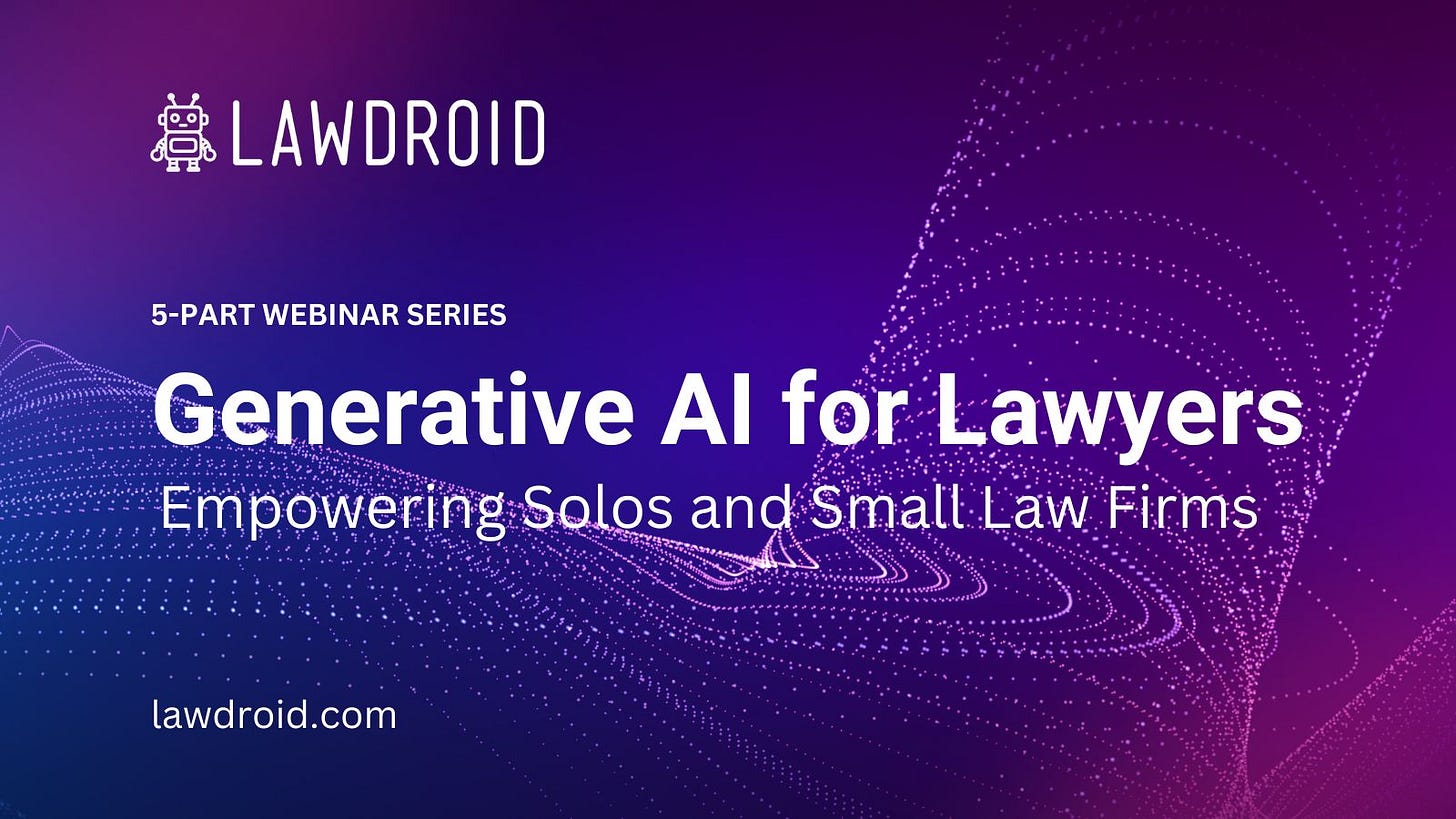Hey there Legal Rebels! 👋
As one of the co-founders of the American Legal Technology Awards, I sometimes get a front row seat to see and hear some amazing things.1 Last month was one of those times.2 My friend and fellow co-founder, Patrick Palace, interviewed some very knowledgeable people about the impact that generative AI (GenAI) is having on the legal industry.
If you want to stay ahead of the curve and understand how artificial intelligence is transforming the legal industry, you need to watch this webinar. Featuring a panel of experts from leading legal industry leading companies like Clio, ARAG, GNGF, and Affinipay,3 this discussion offers unique insights into the challenges and opportunities that GenAI presents for law firms, legal professionals, and clients.
This substack, LawDroid Manifesto, is here to keep you in the loop about the intersection of AI and the law. Please share this article with your friends and colleagues and remember to tell me what you think in the comments below.
Navigating the AI Revolution in Law: Insights from Legal Tech Leaders
Join me for an illuminating panel discussion featuring legal industry leaders share their insights on the transformative impact GenAI is having on the legal profession.
In this thought-provoking webinar, "State of the Industry," hosted by Patrick Palace, Co-founder of the the American Legal Technology Awards, you'll hear from Joshua Lenon (Clio), Ann Cosimano (ARAG), Mark Homer (GNGF), and Dru Armstrong (Affinipay). These experts dive deep into the current state of AI adoption in the legal industry, discussing the opportunities, challenges, and strategies for law firms navigating this rapidly evolving landscape.
The panelists explore critical topics such as the growing interest in AI among lawyers and clients, the importance of building trust when implementing AI solutions, and the need for law firms to invest in comprehensive technology strategies. They also share their predictions for the future of the legal industry, touching on potential changes in fee structures, the communication of legal services' value, and the expansion of access to justice. The host, Patrick Palace, leaves no stone unturned.
This panel is a must-watch for anyone interested in the intersection of law and technology, providing valuable perspectives on how legal professionals can prepare for and thrive in a future where GenAI plays an increasingly central role. Don't miss this opportunity to learn from some of the most influential voices in the legal technology community based on their real world experience.
First, A Little Background
It’s important to understand that each speaker has a different point of view to offer, and that is what makes this State of the Industry panel something that is so valuable and why it is so well-attended each year. Just in case you’re not familiar with the speakers and their companies, let me give you a little introduction:
Dru Armstrong is the CEO of AffiniPay, the parent company of LawPay and MyCase. LawPay is the leading payments solution for lawyers and MyCase is a leading case management solution for lawyers. Affinipay has also acquired several businesses to align with its goal of streamlining professionals’ financial transactions.
Ann Cosimano is the General Counsel of ARAG. ARAG is an international legal insurance company. They provide an affordable legal plan to employees of leading companies to handle their everyday legal needs. ARAG accomplishes this through a network of 15,000+ attorneys in the US.
Joshua Lenon is the Lawyer in Residence of Clio. Clio is an extraordinarily successful case management solution. They help lawyers to keep their law practice organized and running smoothly. Clio annually publishes a Legal Trends Report detailing lawyers’ business practices with rich insights from data and they host the Clio Cloud Conference with amazing speakers.
Mark Homer is the CEO of GNGF, a leading law firm marketing agency and the author of the #1 best selling book on Digital Marketing for Law Firms. GNGF was recently acquired by Scorpion, a leading provider of digital marketing and technology solutions for local businesses.
So, as you can see, each of them really knows their stuff, and from a different perspective: insurance, finance, marketing, and operations. They are not “thought leaders” who haven’t done it in real life.
Presentation Summaries:
Joshua Lenon, Clio
Joshua focused on the impact of artificial intelligence on efficiency in the legal profession. He shared statistics from Clio's 2023 Legal Trends Report, which showed that both lawyers and clients are interested in using AI to improve efficiency and affordability. However, there is still a trust gap that needs to be addressed. Joshua also mentioned that clients expect legal services to become more affordable as a result of AI adoption, which may put pressure on law firms to adjust their fees.
Ann Cosimano, ARAG
Ann discussed ARAG's legal insurance plan and their network of over 15,000 attorneys, primarily comprised of solo and small law practitioners. She shared insights from their annual attorney survey, which revealed that while some attorneys are using AI tools, there might be a gap in understanding what constitutes AI. Ann also highlighted trends in legal issues based on claims data, such as elder law, diversity, equity, and inclusion matters, cybersecurity, and data protection.
Mark Homer, GNGF
Mark presented data on marketing trends and the impact of AI on marketing strategies. He noted that digital marketing has become increasingly important, with paid media and social media advertising gaining traction. Mark emphasized that AI is helping marketers achieve better results with limited budgets by automating tasks like lead scoring, ad targeting, and campaign optimization. He also shared his decision to merge GNGF with a larger company that has an AI-powered platform to better serve clients.
Dru Armstrong, Affinipay
Dru provided an overview of Affinipay's growth and acquisitions, highlighting their vision for law firms running as modern businesses. She discussed the early stages of digital adoption in the legal industry and the impact of COVID-19 and generative AI on accelerating technology adoption. Dru emphasized the importance of building trust when implementing AI solutions and the need for law firms to invest in their technology infrastructure. She also touched on the potential impact of AI on billing models and the cost structure of legal services.
Clips:
Attorneys’ Use of AI in their Practices
GenAI Transformational Impact on Legal
Will AI Replace Lawyers?
Impact of AI on Marketing
Predictions:
Mark Homer, GNGF
As law firms invest more in marketing and leverage AI-powered tools provided by vendors, they will see a significant compound effect on their growth and success, even with a small increase in their marketing budget above the current average of 7%.
Ann Cosimano, ARAG
AI will drive the adoption of alternative fee structures among attorneys, making it more appealing and potentially necessary. Lawyers will need to figure out how to price their services based on the value they provide rather than the time they spend, such as offering unbundled legal services.
Dru Armstrong, Affinipay
The legal industry is currently in the early stages of a massive proliferation of AI use cases, with significant investments pouring in. While the rate of change may be overestimated, the magnitude of the impact is likely underestimated. Law firms will be on a learning curve for the next three to five years as they develop their AI strategies and adapt to changes in fee structures.
Joshua Lenon, Clio
The upcoming legal trends report will reveal that flat fee revenue is growing faster than hourly billing revenue, indicating that law firms are recognizing the need to focus on efficiency. Flat fee billing is a way to protect both the law firm and the client when dealing with technological disruptions like AI. The report will provide a detailed breakdown of this trend.
Notable Quotes:
"95 percent of CMOs are leveraging AI as one of their top investment priorities. 75 percent are already reporting that AI is making positive impact." - Mark Homer
"I think if we can remove a lot of that friction, we can unlock huge value." - Dru Armstrong
"We have seen the rate of flat fee revenue grow faster than the rate of hourly billing revenue. I think that's indicating that law firms are starting to get the picture that there is a need to focus on efficiency." - Joshua Lenon
"57 percent of all the marketing budgets… are going to digital. So we are more than half." - Mark Homer
"What I found interesting is not a single one of them was worried that AI was going to replace them or, or take their jobs. They were indicating they thought AI was the equivalent of a overconfident intern but that that overconfident intern for them, they felt helped free up a lot of their intellectual capital to be able to be used on the more important things." - Ann Cosimano
Key Takeaways:
AI adoption is increasing in the legal industry, with both lawyers and clients showing interest in leveraging AI for improved efficiency and affordability.
Despite the growing interest, there is still a significant trust gap surrounding AI, and law firms need to prioritize building trust with their clients when implementing AI solutions.
Law firms should invest in their technology infrastructure and develop a comprehensive technology strategy to future-proof their practice and stay competitive.
AI is expected to drive changes in the legal industry, including alternative fee structures, improved communication of the value of legal services, and increased access to justice.
While AI may impact certain tasks performed by lawyers and paralegals, it is unlikely to replace legal professionals entirely. Instead, AI may enable lawyers to serve more clients and take on cases that were previously unaffordable.
Closing Thoughts
The legal industry is experiencing a transformative revolution driven by artificial intelligence. As we heard from the esteemed panel of legal technology leaders, AI is no longer a distant concept but a present reality that is reshaping the way law firms operate, market themselves, and deliver services to their clients.
From Joshua Lenon's insights on the growing adoption of AI for improved efficiency and affordability, to Ann Cosimano's observations on the importance of responsible AI implementation, it's clear that the legal profession must adapt.
Mark Homer's emphasis on the power of AI in driving marketing success and Dru Armstrong's perspective on the need for law firms to invest in robust technology infrastructure underscore the critical role that AI plays in the future of legal practice.
It's essential that we approach AI not as a threat to our profession, but as an opportunity to enhance our capabilities, serve our clients better, and expand access to justice.
Of course, the path forward is not without its obstacles. As several of our panelists noted, building trust in AI systems, adapting our billing models, and reskilling our workforce will require a concerted effort and a willingness to experiment and learn.
So let this State of the Industry be a call to action for all of us in the legal community. Let us rise to the challenge, embrace the change, and seize the opportunities that AI presents. Together, we can build a brighter, more innovative, and more equitable future for the legal profession and the clients we serve.
By the way, if you’d like to learn more about how how AI works and how it will impact the legal profession, you should apply to LawDroid University!
My NEW 5-part webinar series, Generative AI for Lawyers: Empowering Solos and Small Law Firms, is now available at LawDroid University.
LawDroid University is available for free for everyone to use.
Free to use - It's 100% free educational content for everyone, just sign up below.
Insightful - Get educated about the intersection of artificial intelligence and the law as taught by experts.
Value Packed - Filled with videos, summaries, key takeaways, quotable quotes, transcripts and more! Find sessions on AI and the State of the Art, Ethics, Access to Justice, Practice of Law, Education, and the Business of Law.
AI Q&A - Ask a chatbot questions about the content and get fully informed answers immediately.
👉 To immerse yourself in this enriching educational voyage, learn more, or sign up, please visit https://lawdroid.com/subscriptions/lawdroid-university/.
I was also the event organizer behind the scenes, ensuring that all went well technically with the Zoom webinar and its contemporaneous live broadcast on Linkedin, Twitter and YouTube.
This webinar was originally “aired live on September 10, 2024.
Full disclosure: Clio, ARAG, GNGF, and Affinipay are not only amazing companies, they are also sponsors of the American Legal Technology Awards.













